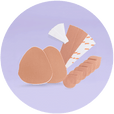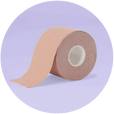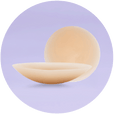Nipple covers, or pasties, are a modern must-have wardrobe accessory. They're perfect when a traditional bra won't do, offering a seamless, invisible solution under your backless dresses, tight tops, swimsuits, or everyday wear.
But, like any accessory, nipple pasties need proper care to stay fresh and ready for use. It's worth it to learn how to properly wash and maintain them — not only so they stay clean, but also so they last and stay sticky for as long as possible.
Nipple Cover Basics
Nipple covers, commonly known as pasties, play a pivotal role in fashion. They provide modest coverage when traditional bras are too impractical for specific outfits.
You might see these handy accessories in various styles. Still, you can broadly classify nipple covers into silicone and fabric. Both types feature an adhesive back for secure placement, but their washing and maintenance differ significantly.

Silicone Nipple Covers
Soft and flexible silicone nipple covers mimic the feel and look of your natural skin. Silicone covers can provide crucial, comfortable support for sheer, strapless, or backless outfits. Plus, they're reusable.
Also, always clean your nipple area with soap and water before applying your covers. Your skin should be dehydrated and free from moisturizers or oils since both can negatively affect the adhesive.
How to Wash Silicone Nipple Covers
Washing reusable silicone nipple pasties requires careful attention to prevent any damage that could make them less effective at staying put.
- Clean the covers immediately after use: Start by rinsing your covers under warm water to dislodge any dirt or debris. Use mild soap and gentle hands, avoiding harsh chemicals to protect the silicone material. Rinse once more to get rid of any soapy residue.
- Let the covers air-dry: Pat the nonadhesive sides of your reusable nipple covers dry with a towel, and leave them to air-dry completely before you stash them away for future use. Avoid using towels or tissues on the adhesive sides since they may leave lint. Place the covers adhesive side up on a clean, flat surface.
- Use the protective film: After cleaning and drying your covers, replace the protective film to prevent dust and debris from clinging to the adhesive, which will reduce the covers' effectiveness.
While it's essential to clean your silicone nipple covers regularly, excessive washing can degrade the adhesive. So wash them only when they've accumulated noticeable debris or after activities that cause you to sweat a lot.
Fabric Nipple Covers
Fabric nipple covers often combine cotton, polyester, or Lycra. They are breathable, gentle on your skin, and a good option for everyday use. Many are disposable, but reusable options do exist.
How to Wash Fabric Nipple Covers
- To clean adhesive nipple covers made of fabric, gently peel them off your skin to maintain their shape.
- Handwash them in lukewarm water with mild soap to remove your body oils and sweat residue.
- Allow them to air-dry completely.
Why It's Important to Keep Your Nipple Covers Clean
Proper nipple cover care ensures a long-lasting and comfortable experience. Regular cleaning after wearing your nipple covers prevents the accumulation of skin cells, oils, and dirt, which can affect the adhesive properties and lead to discomfort or less effectiveness over time. Neglecting proper hygiene can create health risks like skin irritation, rashes, and infections.

Tips for Removing and Washing Your Nipple Covers
Proper maintenance extends the life of reusable nipple covers and ensures they're safe to use. Here are some tips to remember:
- Gently peel off the covers: Slowly detach the covers from the skin to avoid causing shape distortion or damage to the delicate material.
- Inspect the covers before and after each use: Look for any significant accumulation of debris, such as skin cells or general wear and tear.
- Use water for removal: If your nipple covers are hard to peel off, use a warm, damp cloth to soften the adhesive or apply mild soap.
- Air-drying is preferred: Proper drying will enhance the longevity of your nipple covers.
- Use a backing for storage: Once your nipple covers have thoroughly dried, reapply them to the plastic backing they came with, or use cling film.
- Keep dust away: Store your nipple covers in original packaging or a clean, dust-free container.
- Handle the covers carefully: Avoid using harsh chemicals, improper drying techniques, and excessive washing—these can degrade the adhesive and damage the covers.
When to Buy Replacement Nipple Covers
Periodically check your nipple covers for signs of wear and tear, such as fraying edges, discoloration, or a reduced ability to stay put. Remember, Nueboo Nipple Ninjas can last up to 40+ wears with the proper care. But no matter which product you choose, replacing your covers when they show these signs will help to maintain your comfort and ensure you're always caught with an appropriate coverage solution!






0 komentar